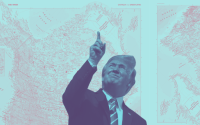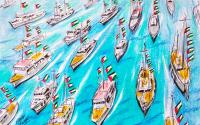27 November 2005
These are the Klondikers of global warming: men from all over the world who have come to Hammerfest, gateway to the Barents Sea, to make their fortune from new resources - oil, gas, fish and diamonds - made accessible by the receding ice.
It is the dark season here - two months from November to January when the sun never rises above the snow-laced rocks around Hammerfest, ice-free thanks to the Gulf stream. In the horseshoe-shaped port, trawlers from all over the world wait for favourable weather to head back into the Barents Sea. Hammerfest, with its colourful wooden houses, feels cosy. But it is a nerve centre of the scramble for the Arctic's wealth that raises urgent questions.
The 14 million sq km Arctic Ocean is home to 25 per cent of the planet's unextracted oil and natural gas. With a population of four million, the region is much more stable than the Middle East. Global warming, in combination with the current high oil price, makes it ever more accessible. Yet the bordering countries - Russia, Canada, the US, Norway and Danish Greenland - have yet to agree on who owns what. Long-forgotten bays, waterways and islands are moving to the top of the international agenda.
Mirreh, 19, has spent eight months as a cleaner at Snow White, a giant liquefied natural gas (LNG) plant at Hammerfest, one of the world's biggest building sites. 'The wage is £20 an hour. I have saved £20,000. The problem is there is nothing to do and not enough women,' he said.
French trawler skipper Pascal Verdière has had no trouble filling his Grande Hermine trawler's 250-tonne cod quota. 'Cod likes a water temperature below two degrees, so whereas, three years ago we did our fishing around 75 degrees north, we now have to go as far as 80 degrees, which means Spitzbergen and bad storms.' But each of his 35 crew earns £15,000 for 12 weeks at sea.
Trawlers are frequently at the centre of territorial disputes. Whereas the Antarctic was carved up in 1959, no international treaty exists to determine the extent of each Arctic nation's ownership. Last month Cryosat, a space shuttle launched to measure the Arctic thaw and the limits of the continental shelves, crashed after lift-off in Russia. As a result, debates are guided by rival scientific studies, such as one which claims the North Pole for Denmark by alleging it sits on Greenland's continental shelf.
Last week the Norwegian coastguard arrested two Spanish trawlers in the waters around the Svalbard Islands, which Norway has unilaterally decreed a fisheries protection zone. Oslo and Madrid are now in a complicated row over who has the right to prosecute.
Norway and Russia are soon to resume talks - stalled for two years - over a disputed area of the Barents Sea. While an agreement exists between them allowing fishing in part of the area, known as the Grey Zone, both countries want access to the larger disputed area for oil and gas exploration. Immediately to the east of the area, the Russians have discovered the 1,400sq km Shtokman field, the largest offshore gas deposit in the world.
Resolution of the dispute could have an impact on the entire Arctic area. The Russians want the 'sector line principle' to be applied, meaning that the Arctic should be divided, cake-like, from the Pole. The Norwegians want the 'median line principle' - a border line along which each point is equidistant to each country's land mass. Despite the rivalries, Arctic expert Olav Fagelund Knudsen doubts whether anyone would go to war over them. 'Russia and the US became pretty good at resolving their differences during the Cold War. So there is room to hope they will be sensible. The most exciting development in the region is who will control the North East Passage and its lucrative shipping between Europe and China.'
He said a Russian mine on Svalbard is already extracting high-quality coal. De Beers, the mining giant, and about 60 other prospecting companies are searching for diamonds beneath frozen lakes in northern Canada. In the US, there is pressure to increase oil exploration. A dispute between Denmark and Canada this year over Hans Island - an uninhabited rock off Greenland - centres on the potential for oil in the Nares Strait. There are outstanding disputes between the US and Canada over the North West Passage and the Beaufort Sea. The Russian parliament has yet to ratify a 1990 agreement with the US dividing the Bering Sea. Only a small international body, the Arctic Council, exists to mediate. Its main focus is the welfare of four million mainly nomadic people. The only legal tool, the Convention on the Law of the Sea, has not been ratified by the US.
Meanwhile, evidence suggests the Klondikers are right to head north. According to data published last month, the area covered by ice in September - 5.3 million sq km - was the lowest since records began in 1978. In August the Akademik Fyodorov became the first ship to reach the North Pole unassisted by an icebreaker.
Opposite the Kaikanten bar, Alf-Birger Olsen sits in the council offices counting the benefits of global warming to the 9,300 population. 'Hammerfest, ice-free all year, was proclaimed a town in 1789. We were a base for polar bear hunters and cod fishermen. But in recent times the Norwegian government had to give people incentives to live in the region,' said the trade and industry director. When talk turns to the Snow White gas project, Olsen's eyes light up. 'Building the plant has required 2,000 people of 57 nationalities ... The population of Hammerfest has increased and dozens of spin-off businesses created.'
The project will come on stream in 2007 to deliver 2.4 billion cubic metres of liquefied natural gas to the US and Spain among others.
Property tax paid by Statoil, the company which owns the £5.8bn Snow White terminal, has provided funding for a new Arctic Culture Centre. 'We are really thankful to Statoil,' said culture chief Gerd Hagen, 'but this development is not all good. When 2,000 men suddenly descend on a little town, it changes things. There are fights at the weekend and women feel the need to withdraw a little bit. They have their bar, Kaikanten, and we have another place in the street behind.'
http://observer.guardian.co.uk/international/story/0,6903,1651724,00.html






